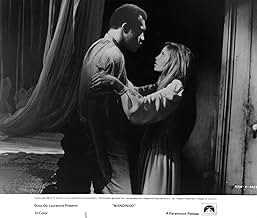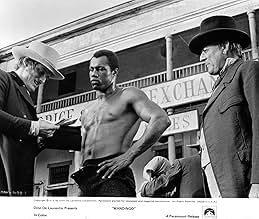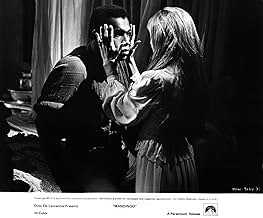CALIFICACIÓN DE IMDb
6.5/10
4.5 k
TU CALIFICACIÓN
Un propietario de esclavos de la década de 1840 entrena a uno de sus esclavos en la lucha a golpes.Un propietario de esclavos de la década de 1840 entrena a uno de sus esclavos en la lucha a golpes.Un propietario de esclavos de la década de 1840 entrena a uno de sus esclavos en la lucha a golpes.
- Dirección
- Guionistas
- Elenco
- Premios
- 1 premio ganado en total
Debbi Morgan
- Dite
- (as Debbie Morgan)
- Dirección
- Guionistas
- Todo el elenco y el equipo
- Producción, taquilla y más en IMDbPro
Opiniones destacadas
Quentin Tarantino has called Mandingo one of the few big budget exploitation films Hollywood has ever produced, and you can definitely see a lot of this film in his Django Unchained. I'm not sure I'd go as far as calling this an exploitation film, but it's certainly startling at times and deals with the subject of slavery without backtalk or ambiguity.
The movie takes place in Deep South prior to the American Civil War. Slavery is at its highest bloom and it's just as bad as you've probably heard. First night rights are freely exercised, slaves are just one step above animals, sold like cattle and while they're not beaten daily – they still need to work, and it's not like you beat your cows daily, either – it doesn't take much for them to incur the wrath of their masters.
The movie is also notable in that it uses the term 'mandingo' somewhat correctly. The term referred to any slave of the highest quality and not just to those who fought against one another. Though even that fighting might be a myth. The movie tells the tale of one particular manor, its owners and the pair of mandingo slave that were brought there, one of them to be trained as a fighter.
It's a tough movie to sit through if you're squeamish and while it's not overly gluttonous in its depictions of violence, like Django Unchained is, it doesn't shy away from them either or pull its punches. A very good movie to check out if you liked Django and/or are looking for a darker historical piece.
The movie takes place in Deep South prior to the American Civil War. Slavery is at its highest bloom and it's just as bad as you've probably heard. First night rights are freely exercised, slaves are just one step above animals, sold like cattle and while they're not beaten daily – they still need to work, and it's not like you beat your cows daily, either – it doesn't take much for them to incur the wrath of their masters.
The movie is also notable in that it uses the term 'mandingo' somewhat correctly. The term referred to any slave of the highest quality and not just to those who fought against one another. Though even that fighting might be a myth. The movie tells the tale of one particular manor, its owners and the pair of mandingo slave that were brought there, one of them to be trained as a fighter.
It's a tough movie to sit through if you're squeamish and while it's not overly gluttonous in its depictions of violence, like Django Unchained is, it doesn't shy away from them either or pull its punches. A very good movie to check out if you liked Django and/or are looking for a darker historical piece.
This film is not for the faint of heart, this film is for hardcore truth viewers who aren't squeamish, the film may be dated but the essence is truthful & too the point, this film should be "Mandatory" for students taking a U.S. or African American history course.
1975's "Mandingo" earned much scorn from such highbrow critics as Roger Ebert, such was its unflinching look at slave relations in the Antebellum South, including numerous interracial couplings featuring full frontal nudity. The series of Falconhurst novels began with Kyle Onstott's original 1958 publication of "Mandingo," named for a specific type of fighter from the West African Niger region, also known for its later use by Alex Haley in his largely fictional yet compelling family history "Roots," the miniseries still two years away from its debut broadcast. Producer Dino De Laurentiis spent a number of years trying to finalize a deal, and with the relaxation of the old ratings system could never have filmed such a sordid tale until the 70s, a decade of untold exploitation where 'anything goes,' and often did. Director Richard Fleischer initially turned the assignment down but finally relented, James Mason earning top billing as plantation owner Warren Maxwell, in a role rejected by James Cagney and Charlton Heston, Perry King as son Hammond in place of Jan-Michael Vincent, Jeff Bridges, Beau Bridges, and Timothy Bottoms. Hammond is mostly portrayed as a sympathetic figure toward his slaves, often at odds with his harder edged father, his subsequent marriage to cousin Blanche (Susan George) soured on their wedding night by her less than virginal countenance under the sheets (as was so often the case, the girl was deflowered by her own brother). Hammond's purchase of new 'bed wench' Ellen (Brenda Sykes) does not go unnoticed by an increasingly irrational Blanche, eventually taking revenge on her faithless spouse by summoning Mandingo fighter Mede (Ken Norton) to her bed, producing a non white child that is quietly allowed to bleed to death, poor Blanche poisoned and defenseless Mede shot, scalded, and butchered by pitchfork. Critics were appalled by the brutality of Norton's no holds barred fight scenes, and the nihilistic climax left audiences appropriately stunned, a game cast putting forth a great effort to bring such unhappiness to vivid life. Interiors are effectively dark and gloomy, furniture sparse and guests rarely in evidence, slaves variously bought and sold to keep the rundown plantation afloat (location shooting in Louisiana). Susan George gives an uncanny rendition of Bette Davis in a part that few actresses would brave, and even at the end still earns sympathy making tearful entreaties to her unfeeling husband. James Mason and Perry King also acquit themselves well, as does Richard Ward as the intelligent Agamemnon punished for being able to read, and Ji-Tu Cumbuka, later Kunta Kinte's Wrestler on ROOTS, making the strongest impression as a runaway slave who prefers death to a life enchained. Personal preference impacts how one sees this picture, slowly gaining increased stature over the years, and certainly better than its immediate sequel "Drum," Ken Norton returning as a new character.
This unflinching, hard-hitting look at slavery is a severely underrated and misjudged film. That's probably because it sheds light onto a tough, painful subject that many people would prefer to ignore or forget; if you're expecting a "slaves-and-masters-are-all-a-big-happy-family" depiction of the life in the mid-19th-century Southern plantations, then this simply isn't your movie.
"Mandingo" was followed, one year later, by "Drum". They are both far better films than their reputations might make you believe, and they are also handsome, almost sumptuous productions with a far lower "sleaze" quotient than many reviews seem to indicate. They are both worth seeing - preferably as a double bill. (***)
"Mandingo" was followed, one year later, by "Drum". They are both far better films than their reputations might make you believe, and they are also handsome, almost sumptuous productions with a far lower "sleaze" quotient than many reviews seem to indicate. They are both worth seeing - preferably as a double bill. (***)
This movie is a disturbing look at the realities of the antebellum South. And yes, I do believe the depictions and events in this movie are realistic. Such atrocities are well-documented. Both the movie and the book contain graphic violence, sex, and rape. The movie is sometimes difficult to watch, but it's worth watching, for anyone who ponders the evils of humanity and especially the history of the U.S. during the 1800's. The acting and film quality aren't upper echelon. The dialogue is sometimes excessively histrionic. But that's not what's so good about this movie. It's gritty, realistic, and brutally honest.
As I watched, I realized that maybe things haven't changed so much since those times. Racism and sexism are still very much alive. You can easily compare the attitudes and behaviors depicted in this film with things that go on in our society today. Some people have commented that Blanche was "oversexed". I find that a rather hilarious statement. They obviously don't get the feminist subplot of this movie. The way it depicts and breaks down racism and sexism and shows exactly why they're faulted ideologies is why I love this movie so much!
As I watched, I realized that maybe things haven't changed so much since those times. Racism and sexism are still very much alive. You can easily compare the attitudes and behaviors depicted in this film with things that go on in our society today. Some people have commented that Blanche was "oversexed". I find that a rather hilarious statement. They obviously don't get the feminist subplot of this movie. The way it depicts and breaks down racism and sexism and shows exactly why they're faulted ideologies is why I love this movie so much!
¿Sabías que…?
- TriviaJames Mason admitted in interviews that he only made the film to make his alimony payments.
- ErroresDuring Mede's first fight in the city, he and his opponent are wrestling on the grass. When they roll over on the floor, the grass moves like a slipping carpet would, revealing it to be a sheet of artificial green, probably lying on the floor of a sound stage.
- Versiones alternativasThe international version of the film (released on PAL region 2 DVD) contains a different cut of the film that runs approx. 5 minutes shorter than the U.S. release but also has many scenes presented in alternate clothed takes. In all 12 scenes were either trimmed or re-edited with alternate shots/angles/takes:
- Scene where slave is bent over and inspected for hemorrhoids is cut.
- Scene where the wench is being prepared for her deflowering is presented in an alternate take where her breasts are not exposed.
- Scene with pregnant wench is shot with alternate angles to obscure nudity. Perry King's full frontal nudity is cut and replaced with a closer shot that reveals he is wearing shorts when he kneels down to pray (It looks like a goof - only a bit of the waistband can be seen at the corner of the frame).
- Alternate takes of the slave being strung up to be beaten are used to obscure nudity, and many shots of him being beat and left bloody are cut.
- A few seconds where Perry King's cousin rips off a wench's dress and bends her over to begin beating her is cut to remove nudity. The beating is left intact.
- The slave market scene is edited to remove the topless wenches on display, and the shot where the German widow sticks her hand into Ken Norton's shorts and "inspects" him is cut short. The second shot with her hand in and then removing it is left intact though.
- An alternate take is used with a prostitute clothed rather than nude at the bawdy house.
- A few seconds of a prostitute rubbing on Perry King's crotch is cut.
- An alternate take is used during the fight at the bawdy house so that a prostitute is seen holding her dress up while she cheers whereas in the original she lets it fall and her breasts be exposed.
- The entire scene between Perry King and Brenda Sykes in which she asks him if he'll let their child go free is presented in alternate clothed takes. In the original film they are both completely nude. Even the camera angles and setups are the same, only with clothes in the international version.
- In the scene where Ken Norton fights a man to death one long shot where the other fighter claws his back is cut. Also cut is when Ken bites down on the other fighter's neck, is pulled off, and then bites into his neck again. All the close-ups are cut.
- The Susan George/Ken Norton love scene is almost entirely missing. Ken Norton's nudity is cut, and then the scene ends in an alternate take when the two go out of frame onto the bed. The original scene went on for much longer and exposed Ken Norton's buttocks and Susan George's breasts. The German theatrical version does not feature any of these alterations and is identical to the U.S. release.
- ConexionesFeatured in Sooner or Later (1979)
- Bandas sonorasBorn in This Time
Music by Maurice Jarre
Lyrics by Hitide Harris (as Hi Tide Harris)
Sung by Muddy Waters
[Played during opening title and credits]
Selecciones populares
Inicia sesión para calificar y agrega a la lista de videos para obtener recomendaciones personalizadas
Detalles
- Fecha de lanzamiento
- País de origen
- Idiomas
- También se conoce como
- Bitmeyen Kavga
- Locaciones de filmación
- Productoras
- Ver más créditos de la compañía en IMDbPro
Taquilla
- Total en EE. UU. y Canadá
- USD 2,433,010
- Tiempo de ejecución
- 2h 7min(127 min)
- Mezcla de sonido
- Relación de aspecto
- 1.85 : 1
Contribuir a esta página
Sugiere una edición o agrega el contenido que falta



































